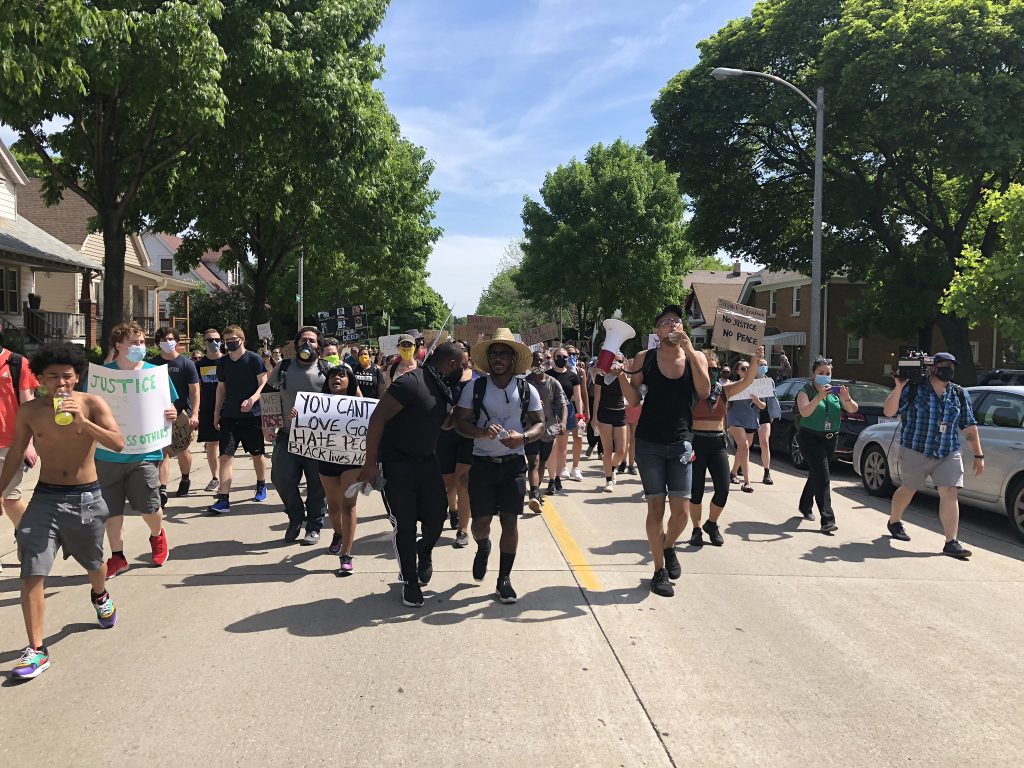State DOJ Rejects Records Request on Police
What actions are police in Milwaukee, other cities taking against protesters? Open records request rejected.
The Wisconsin Department of Justice (DOJ) has denied the Wisconsin Examiner’s request for public records pertaining to police action against protesters in Milwaukee.
The requests, made on June 26 under the Freedom of Information Act, were denied because the records “concern an investigation that is continuing at this time,” according to the DOJ’s July 15 letter in response.
The Examiner first made the open records request to the Wisconsin Statewide Intelligence Center (WSIC), a hub for law enforcement intelligence across the state known as a Fusion Center. Within days, WSIC forwarded the request to the Wisconsin Department of Justice (DOJ).
The Examiner requested documents around protests in Milwaukee that began on May 29, following the death of George Floyd in Minneapolis. The request sought incident overviews and recommendations or directives for police action on the ground against protesters and organizers.
Many of the specific documents requested by Wisconsin Examiner are the same type released in the recent “Blue Leaks” document dump. First published by the website Distributed Denial of Secrets (DDOS) the leaked documents, which were shared among several police units including Fusion Centers, were pulled by the hacktivist collective Anonymous. They demonstrate significant levels of attention and surveillance by law enforcement of the Floyd-inspired protests.
A unit within the Milwaukee Police Department (MPD) Fusion Division — known as the Virtual Investigations Unit — sent handwritten tickets for curfew violations to at least one local protester in past weeks. The $691 ticket was mailed to the man after he’d posted a video of himself on the street after a 9 p.m. curfew. The city attorney said that most if not all of these curfew violations would be dropped.
As the protests have continued, marchers have increasingly expressed fears that they’ve been placed under surveillance for their activism. Cars being towed before planned events, unusual phone calls from police, electronic disruption, and house visits from local and federal law enforcement are now frequent, according to marchers.
During the first couple of nights of protest, instances of looting were reported in parts of the city. Since then, however, Milwaukee’s daily marches have been peaceful. Protests have also occurred in surrounding communities. In Wauwatosa, protesters marched through Mayfair Mall, shut down the Cheesecake Factory, and shouted down city meetings. These demonstrations, though disruptive, have been non-violent.
Reprinted with permission of Wisconsin Examiner.
More about the 2020 Racial Justice Protests
- Plea Agreement Reached On Long-Pending Sherman Park Unrest Charges Involving Vaun Mayes - Jeramey Jannene - Oct 17th, 2024
- Rep. Ryan Clancy Settles With City Following 2020 Curfew Arrest - Jeramey Jannene - Dec 12th, 2023
- Supervisor Clancy Applauds Settlement in Clancy vs. City of Milwaukee - State Rep. Ryan Clancy - Dec 12th, 2023
- Tosa Protest Assails Federal Court Decision Exonerating Police - Isiah Holmes - May 9th, 2023
- Wauwatosa ‘Target List’ Trial Begins - Isiah Holmes - May 3rd, 2023
- Shorewood Spitter Found Guilty For 2020 Protest Confrontation - Jeramey Jannene - Apr 20th, 2023
- City Hall: City Will Pay 2020 George Floyd Protester $270,000 - Jeramey Jannene - Feb 14th, 2023
- Tosa Protest Tickets Dismissed - Isiah Holmes - Jul 21st, 2022
- Op Ed: ‘We Need More’ - Charles Q. Sullivan - Mar 4th, 2022
- Milwaukee Officers Circulate “2020 Riot” Coins? - Isiah Holmes - Nov 14th, 2021
Read more about 2020 Racial Justice Protests here


















